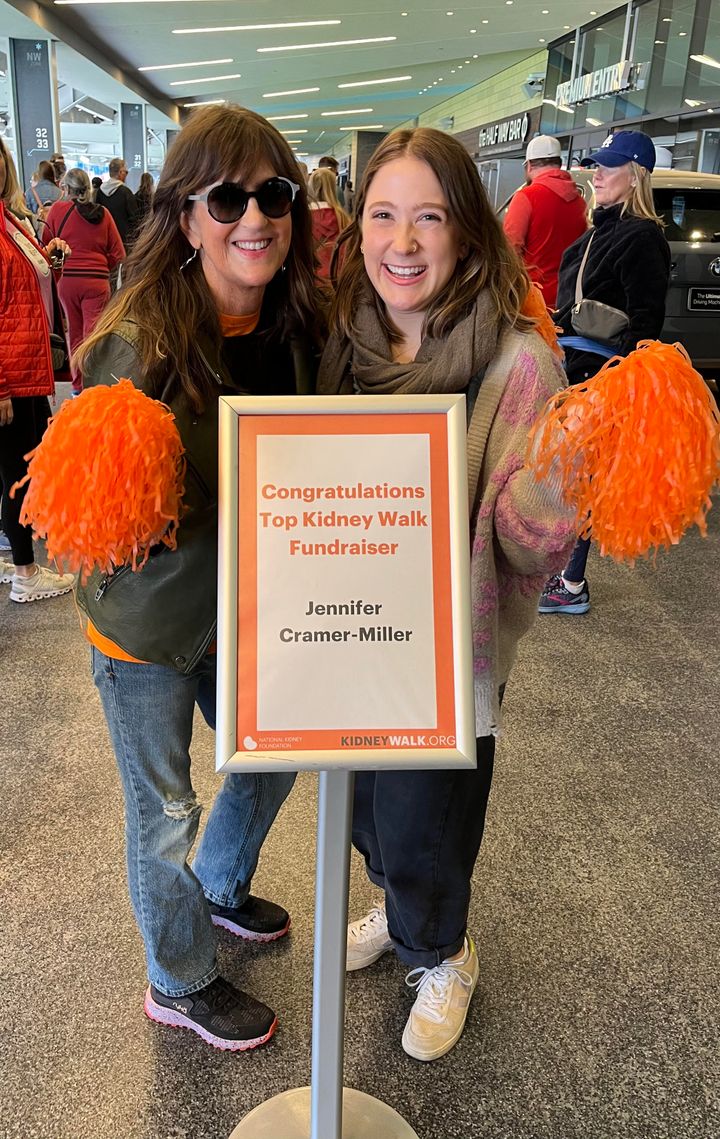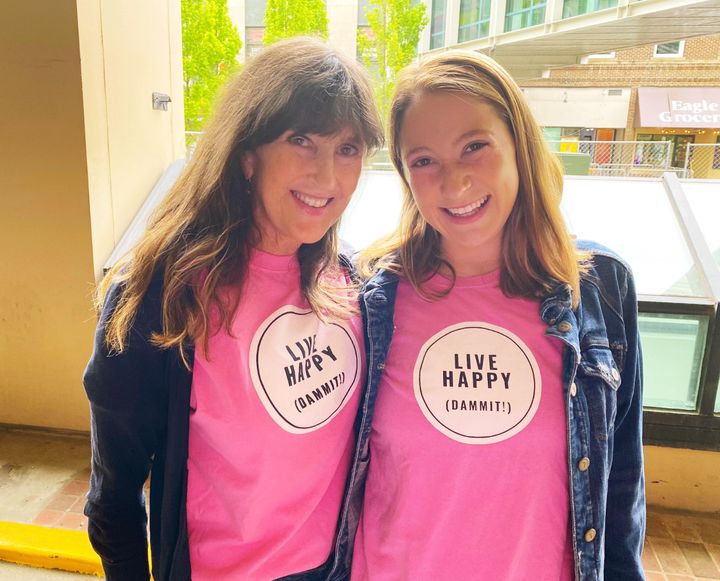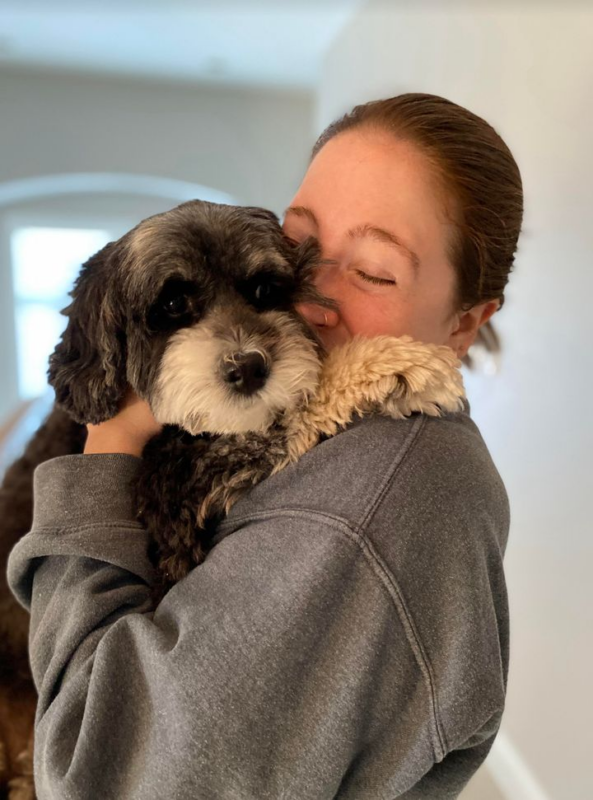News
I Need A New Kidney. My Daughter Wants To Give Me Hers — But How Can I Accept It?
I slide closer to Liza, my only daughter, sitting on the cream chenille sofa as she explains she wants to donate her kidney to me. The knot in my gut tightens. My maternal instincts rise like an emotional geyser.
It’s cozy in the house, but a cold January sky tops snowy evergreens beyond the window. Liza lives in Philadelphia, but she can work anywhere remotely, so she has come home to Minnesota for an extended holiday visit.
Her words melt me, and I clasp one of her hands with both of mine.
She wants to protect me and make everything OK. But isn’t this my job? My innate instinct to protect her from harm was instantaneous from the moment she was born 25 years ago.
Even during my pregnancy, a fierce parental protection circulated through me, and it hasn’t dissipated. I’d still move a mountain for her, so my mama-bear nature doesn’t know how to process this.
Decades ago, when all my friends were reading “What to Expect When You’re Expecting,” I longed to buy that book too. But unlike all my friends, I’d had two kidney transplants within six years because, out of the blue, at 22, an autoimmune kidney disease forced me to process the word “incurable.” I feared my body wouldn’t be a friendly hotel for a developing life.
That’s why, the moment a blue cross appeared on a white stick, I believed in miracles.
My high-risk pregnancy breezed by until 28 weeks. Then, complications triggered concerns about premature delivery.
My nurse relayed the potential health effects that can result from prematurity. A colossal panic bombarded me from head to toe. To fend off my terror, I focused on one thought only: My baby must be OK.
And how could I possibly deliver a baby early? I hadn’t taken classes yet! My doctor assured me women have birthed babies in fields long before classes were a thing. She’d said I’d receive on-the-job training and learn by pushing through it.
With a medical team standing by, little Liza — a smidge over four pounds — made her entrance at 33 weeks.
For five weeks afterward, I rushed to the neonatal intensive care unit every morning to watch her grow under incubator lights. Her miniature fingers gripped tightly to mine, and that protective surge permeated me. I recited these words over and over: She’s strong. She’s a mighty miracle. We’ll be okay.
Courtesy of Jennifer Cramer-Miller
So now, as Liza rests her adult-sized hand on mine and offers her kidney, my feelings are a tangled mess.
“I really want to do this, Mom,” she says. Her brown eyes lock with mine, and I see so much goodness shining towards me.
Over the years, I’ve stressed the importance of kindness. Maybe she’s taken that lesson too far. Now I’m voicing sarcastic quips in my head to shield myself from the gravity of my emotions.
“I’ll be devastated if I don’t try and see if I’m a match,” she continues. I want to get swallowed by the couch cushions and disappear, but instead, I hug her hard.
We decide not to decide. It’s not up to us, anyway. We’ll take it one step at a time. So, Liza calls the Mayo Clinic Transplant Center to set up an initial phone interview.
A few days later, fueling herself for the phone call, Liza snags a lemon Luna bar from the pantry and blasts the Rocky theme song throughout the kitchen. Punching the air with energetic vigor, I watch her psych herself up for success.
I join in and gesture slow motion arm raising like Rocky’s victorious ascent up the Philadelphia Museum of Art steps. Da na na na, da na na na. Liza scoops up our pup and twirls, and I love how we can infuse silly joy into serious matters. This moment reminds me that whatever happens, we’ll make the best of our time together.
Her phone call is minutes away. I squeeze her hand. It’s the same hand that gripped mine from her incubator. Grown up. But still holding on.
I remember how those fingers had gripped her sage chenille blanket at toddler tuck-in time. Half of her sweet face had peaked out above the blanket’s satin edge when she’d told me I was like her garbage man. After flashing a quizzical look, she’d said, “Because when I tell you scary thoughts, you take them away.”
Aren’t parents hard-wired to do this — haul away our kid’s garbage and make everything OK?
As her mom, I’d promised to protect her from hurts and hardships. How can I accept her kidney donation?
Through previous experience and as the local board chair of the National Kidney Foundation, I know the research on the safety of living donation. But everything looks different through a maternal lens. My head spins with concerns about risks and results, so I revert to self-talk. Don’t get ahead of yourself. One step at a time.

Courtesy of Jennifer Cramer-Miller
After the initial phone call, Liza returns to Philadelphia. The next step: further testing at the transplant clinic.
Winter retreats and spring’s hopeful light brightens the sky. Late on a May Tuesday afternoon, Liza, my husband, Dirk, and I drive 90 minutes south to Rochester’s Mayo Clinic. Elton John’s “Mona Lisas and Mad Hatters” plays on the car radio, and select lyrics etch into my head.
“And I thank the Lord there’s people out there like you. I thank the Lord there’s people out there like you.”
We check into adjoining rooms at the Marriott hotel that connect to the medical facility. Wednesday morning, piercing alarms jar us awake at 5:15 a.m. After speedy showers, we hightail it to the nearby lab to check in for Liza’s 6 a.m. lab appointment.
The line moves efficiently while generic sounding saxophone music plays overhead. We hear the woman ahead of us check in, and oddly enough, her name is also Liza Miller. Our eyebrows raise in disbelief. How random. Then we joke about a colossal mix-up where I receive another Liza Miller’s kidney by accident.
My Liza Miller checks in, and we wait in burgundy vinyl chairs. A cheerful lab technician calls out in a vigorous voice, “Liza Miller.”
Our turn. We follow behind a young woman with burgundy scrubs and a high swinging ponytail. She leads us into a small room.
Liza sits and extends her left arm so the technician can fasten an orange tourniquet above her elbow. My heart constricts, mirroring the tourniquet’s squeeze, and I see 18 empty tubes with multi-colored rubber tops.
I’ve had my blood drawn umpteen times, but it’s distressing to watch my daughter go through this. She gently closes her eyes as the glass tubes fill. Knots of anxiety take residence in my shoulders. I focus on her bravery and inhale a deep breath. What are we doing here?
Next, a blue blood pressure cuff with a reddish tube becomes her new accessory for 24 hours. We note how it coordinates with her brick red and blue checked shirt, and cheer for small victories. The cuff tightens and murmurs every 20 minutes to record her blood pressure.
The appointment locations are scattered throughout the campus, so we accumulate many steps getting from one to the next. Walking past the gift shop, I spot a T-shirt in the window that says, No One Fights Alone.
Elton’s song still loops in my head: “I thank the Lord for the people I have found.” My throat tightens, and I try to swallow the burgeoning lump that is lodged there.
The day concludes with a social worker appointment. Dirk and I wait in an area filled with other people hanging onto hope as they navigate appointment after appointment. Liza appears and joins us. She says the social worker asked her to rate her donation interest on a scale of 1 to 100. Smiling broadly, she told us her answer: “150%.”
That night, Dirk falls asleep instantly. Liza and I plop face to face in her bed in the adjoining room, head on pillows, processing the day with words. How many times have we hashed things out like this in her bedroom or mine? Now at a hotel adjacent to the Mayo Clinic.
We agree, this day feels enormous. So, we recap that we’re just trying to learn if she is a match. That’s all. No decisions now.

Courtesy of Jennifer Cramer-Miller
Liza asks me to stay until she’s asleep. Gladly. I flip the pages of a book by her side and listen to her blood pressure cuff hum every 20 minutes. How many times have I snuggled by her side when she was little, waiting for her safe passage into slumber?
By Thursday at noon, Liza’s last scheduled appointment is complete. But we learn there is another test she needs to complete at home in Philadelphia. She bristles with frustration, and we leave without answers.
At home, the intensity of the past two days hits. I’m weepy, overcome by love, guilt, gratitude and the enormity of our meshed lives.
On Sunday morning, Liza packs her bag upstairs. In the kitchen with misty eyes, I ask Alexa to play Adele while I make sweet potato pancakes. Flying down the stairs, laughing as tears glisten her eyes, Liza stops the music and exclaims, “Mom! What are you doing? For God’s sakes, no Adele allowed!”
Together, we laugh. She hands me a card and goes back upstairs to resume her packing. I open it and Adele’s emotional power is no match for the handwriting I know so well. Inside, she wrote, “150%.”
As we head to the airport for her flight back to Philadelphia, Liza says, “I know this feels big to you, Mom. But of course, I want to do this. Because it’s us.”
The additional testing took months to schedule. But in mid-July, Liza calls. Her voice sounds both shaky and ebullient. “Mom. I just got approved to give you your next kidney.” I fold over and gulp hits of air; my voice wails a sound I’ve never made before.
“We’re a direct match,” she beams.
“A direct match?” I eke, struggling to comprehend if this news is real. But Liza’s voice spreads over me like warm honey.
“I knew we would be, Mom. We’ve always been so compatible.”
Even though I can’t reach through the phone to interlock our fingers, I feel our indelible grip tighten. My daughter is determined to safeguard me. She wants to take away my garbage. It’s disorienting, this reversal of protection.
But I realize looking after each other hasn’t reversed, it has become mutual. And circular.
Maybe, if I accept her benevolent gift to protect me, in a way, I am protecting her. Her future. Our future. So we can stay together longer.
I wish Liza’s beautiful benevolence could wrap this story up with a shiny bow, but that’s not real. Love can’t wipe away the anxiety that weaves into the consideration of two surgeries. Uncertainty remains, and no garbage man can haul it all away.
Now, my doctors continually monitor my health. Eventually, my declining kidney function won’t sustain my life. When that happens, we’ll pull out my old playbook: receive on-the-job training and learn by pushing through it.
And just like I did as a younger parent when I’d held Liza’s burrito-bundled body decades ago, I’ll recite the same words again: She’s strong. She’s a mighty miracle. And we’ll be OK.
Jennifer Cramer-Miller is an author and speaker, focusing on stories of hope. Jennifer’s new memoir, “Incurable Optimist: Living with Illness and Chronic Hope” (She Writes Press) is available now. Jennifer serves as the 2023-2026 Board Chair for the Minnesota National Kidney Foundation (NKF), an NKF PEER Mentor, and a Donate Life ambassador. You’ll find her essays featured in Zibby Mag, Brevity Blog, The Sunlight Press, Grown & Flown, The Erma Bombeck Blog, Star Tribune, Minnesota Physician, Mamalode, and Medium. To learn more, visit her at jennifercramermiller.com.
Do you have a compelling personal story you’d like to see published on HuffPost? Find out what we’re looking for here and send us a pitch at pitch@huffpost.com.
Read more

